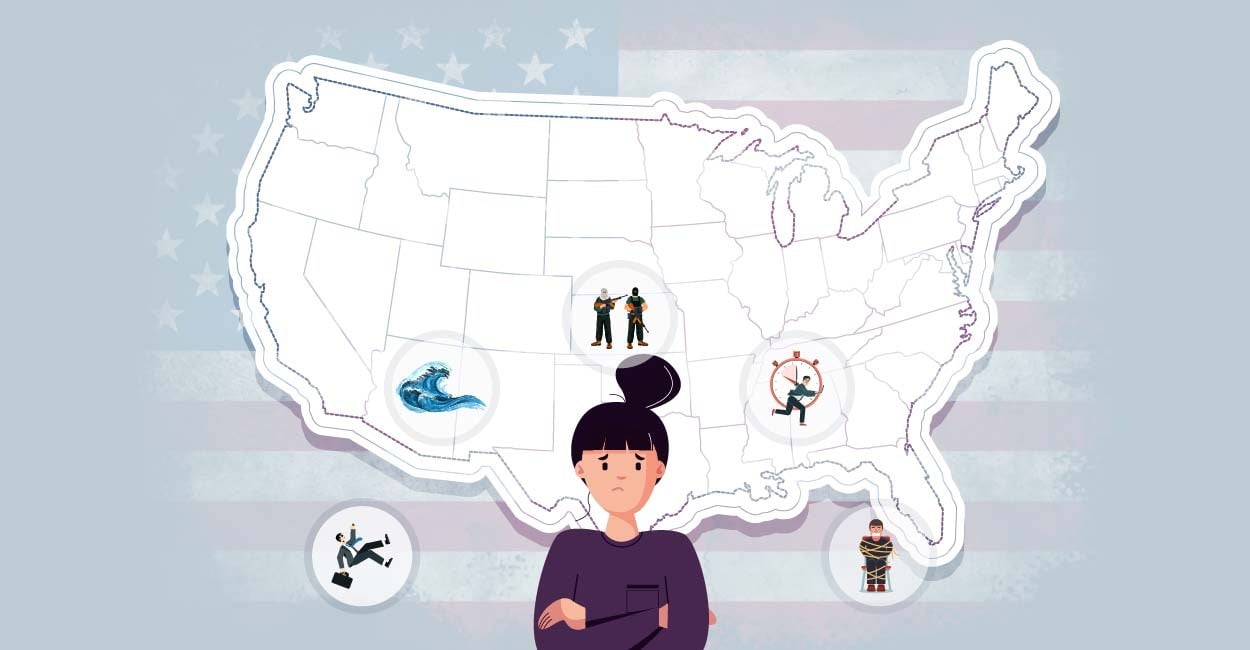Recently, the team of ThePleasantDream conducted a one-of-its-kind survey to understand the impact of trauma on people’s dreams.
Out of 502 people who participated in the survey globally, 256 of them were from the United States of America. Among them, 90.56% of the participants had experienced a traumatic event in their lives.
The team collected data through an online survey on the website and social media platforms.
Let’s see what the research revealed.
Demographics of the survey participants
Of the 256 participants from the United States of America, 80% belonged to the age bracket of 21-35 years, followed by 8% falling in the age bracket of 15-20 years and 35-40 years each.
Again, 77% of the participants were female and 23% were male.
62.26% of the participants were working professionals, followed by 22.64% who were students. Additionally, 7.6% of the participants were entrepreneurs.
What do the statistics say?
90.56% of the participants said that they did experience a traumatic event in their life. These traumatic events could have been a nasty breakup, the death of a loved one, or the loss of a job, etc. 9.44% of the participants answered that they have never experienced trauma in their lives.
Again, out of 90.56% of the participants, 85% said they had experienced traumatic or weird dreams after the traumatic event. On the contrary, 15% did not experience any traumatic dreams following their traumatic experience.
What was the most common recurrent nightmare after the incident?
19% of participants answered “unprepared for an examination” as the most common nightmare they experienced after a traumatic event in their life. Followed by “falling from a high altitude” and “being chased” with 18% and 15.2%, respectively. Besides these, various other distressing dream scenarios were mentioned by the participants, as can be seen from the below-given graph.
How often do people experience traumatic dreams?
The participants were asked ‘how often they had traumatic dreams?’ The team received a variation of answers –
- 32.07% of participants experienced traumatic dreams “once a month.”
- 22.64% of participants encountered “every day.”
- 17% of participants answered, “once a year.”
- 15.9% suffered from traumatic dreams “once in 2-3 months.”
- 13.2% of participants struggle with traumatic dreams “once a week.”
Do people STILL experience these traumatic dreams?
Experiencing trauma can often leave a person in a shattered and agonizing condition for a long time, so the team asked the participants if they still experienced traumatic dreams. To this, their answers were –
- 56.6%% answered “Yes.”
- 43.4% answered “No.”
What was the preferred coping mechanism to deal with their traumatic dreams?
Traumatic dreams can be filled with anxiety and can severely hamper sleep. One common characteristic of such dreams is that they are recurring in nature, i.e., once a person experiences trauma, they may repeatedly see some traumatizing dreams after the incident.
So, when asked how they managed their traumatic dreams, participants gave the following answers:
- 50% answered “keeping busy” is the best way to cope with traumatic dreams.
- 21% of respondents answered, “Talking to a loved one.”
- 16% of respondents answered “meditation.”
- 5% of respondents answered “psychologist or psychiatrist.”
- 4% of respondents answered “journaling.”
- 2% of respondents answered, “working out till I am completely exhausted.”
- Lastly, the rest 2% of the respondents claimed that “with time” they were over their traumatic dreams.
Expert’s Opinion
Dr. Nereida Gonzalez-Berrios, MD, reviewer and certified psychiatrist of ThePleasantDream, commented, “Traumatic events can severely impact the inner framework in our brains, and people can also experience a change in their dreaming patterns.”
She added, “Most people experience traumatic events during adulthood, which is corroborated with the survey findings as well. The survey also revealed that working professionals suffer the most from traumatic dreams. This happens as adulthood is the most stressful time when people are busy juggling their careers, relationships, along with their familial obligations. “
While discussing the coping mechanisms of traumatic dreams, Dr. Nereida said, “It’s unfortunate that half of the participants (50%) in the USA have chosen to distract themselves rather than heal the root cause of these distressing dreams. Healing the trauma could significantly reduce or even stop the occurrence of such dreams.”
She further elaborated, “People need to consult a mental health professional or resort to journaling & meditation to start their healing journey. This would greatly benefit them and enable them to enjoy a peaceful & refreshing sleep.”

